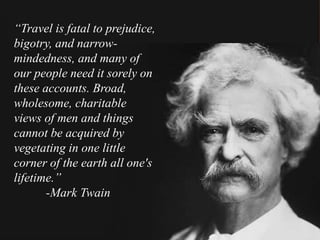8_Elements_of_Culture2.0.pptx
- 1. “Travel is fatal to prejudice, bigotry, and narrow- mindedness, and many of our people need it sorely on these accounts. Broad, wholesome, charitable views of men and things cannot be acquired by vegetating in one little corner of the earth all one's lifetime.” -Mark Twain
- 3. There are 8 categories that anthropologists (people who study mankind, past and present) use to look at the culture of a group of people: 8 Elements of Culture
- 5. Social Groups ? How a society puts people together ?Examples: ? Economic- upper class, lower class, middle class ? Cliques- what groups or clubs you belong to ? Family Units ? Gender based ? Common Interests- religion, jobs, politics, sports
- 7. Art ? How people express themselves ?Examples ?Music ?Painting ?Sculpture ?Architecture
- 9. History ? What people think are important to pass to future generations ?Examples ?People ?Events ?Wars
- 11. Daily Life ? What people do every day ?Examples ?Housing ?Food ?Entertainment
- 13. Economy ? What provides the goods and services that are bought, sold, and used ?Examples ?Mining ?Service Industry ?Agriculture ?Manufacturing
- 15. Government ? Who has the power and makes decisions ?Examples ?Dictatorship ?Democracy ?Parliamentary ?Monarchy
- 17. Language ? The ways people communicate ?Examples ?Written language ?Oral language ?Non verbal language
- 19. Religion ? What people believe in/ how they explain the unexplainable ?Examples ?Death ?Birth ?Rights of Passage ?Rituals
- 21. Culture





















